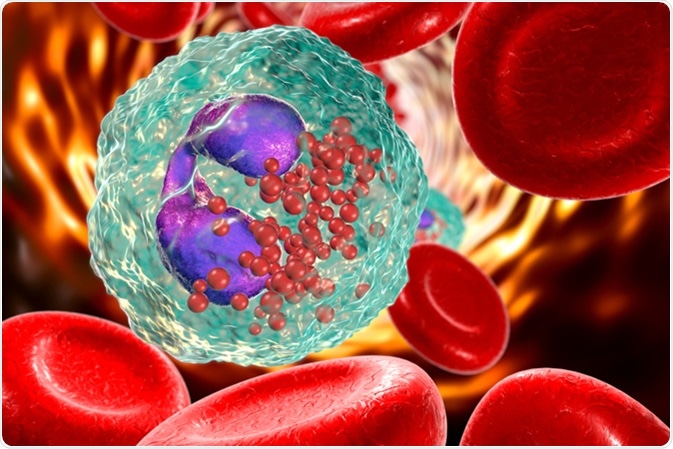Eosinophils are an essential part of the immune system. Called effector cells, they are a type of white blood cell that is activated during allergies, infections, or cancer. When activated, they increase in number and aid the body in fighting infection and disease, including:
- Allergic disorders
- Skin conditions
- Parasitic and fungal infections
- Autoimmune diseases
- Some cancers
- Bone marrow disorders.
Typically, eosinophils make up around 0.5 to 1% of white blood cells, but this percentage may increase to 3 to 5% in patients with allergic symptoms. When eosinophil numbers remain high for an extended period of time, they can cause tissue damage from chronic inflammation.
There are three types of eosinophilic gastrointestinal disorders (EGID), classified according to the location of the eosinophils:

Eosinophil in blood, a white blood cell, 3D illustration. Eosinophils are granulocytes taking part in allergy and asthma, protection against multicellular parasites. Image Credit: Kateryna Kon / Shutterstock
Eosinophilic esophagitis (EoE)
This is the most common type of EGID. Large numbers of esoinophils are found in the esophagus, the tube that carries food from the mouth to the stomach.
Eosinophilic gastroenteritis (EG)
EG affects either the stomach or the small intestine. Eosinophilic enteritis (EE) also affects these areas.
Eosinophilic colitis (EC)
This is the rarest form of EGID. Large numbers of eosinophils are found in the large intestine.
Symptoms of Eosinophilic Gastrointestinal Disorders
As eosinophilic gastrointestinal disorders can affect any part of the gastrointestinal system, symptoms are varied. They can include:
- Dysphagia (difficulty swallowing)
- Heartburn
- Abdominal pain
- Nausea
- Vomiting
- Diarrhea
- Weight loss
- Bloating
Risk Factors for Eosinophilic Gastrointestinal Disorders
Eosinophilic gastrointestinal disorders may affect anyone of any age, with the peak incidence being in children and adults between 20 to 50 years of age. Research into sex-related incidence shows that 75% of patients with EoE are male. 70 to 80% of patients also have allergic disorders including asthma, eczema, and seasonal and food allergies. Ethnicity does not seem to play a role in increasing one’s risk of developing EGID.
Treatment for Eosinophilic Gastrointestinal Disorders
Eosinophilic gastrointestinal disorders are rare and have no known cause. At present, there is no cure, and symptoms often return when treatment is stopped. Patients with EGID require long-term treatment which varies with the part of the gastrointestinal (GI) system affected. When untreated, EGID can result in malnutrition, stunted growth, and anemia. Other complications include the narrowing of the esophagus that can cause problems with swallowing.
Typically, treatment includes medication and dietary adjustments. In-depth assessments are carried out to identify and eliminate possible food or environmental allergies.
Dietary Adjustments
As patients with EGID are also likely to have food allergies that are contributing to the increase in eosinophils in the GI system, dietary therapy is often the first call for treatment. Dietary therapy can include:
Four-food elimination diet
This is a diet in which patients eliminate dairy, eggs, wheat, and soy.
Six-food elimination diet
This is a more restrictive version of the four-food elimination diet. Patients exclude dairy, eggs, wheat, soy, peanuts and other nuts, fish, and shellfish. These are the six most allergenic foods.
Targeted elimination diet
Targeted elimination is based on results from allergy tests, and includes taking out all foods that have positive results in allergy tests.
Elemental diets
These diets are the most restrictive. All sources of protein are excluded, and patients get nutrition from an amino acid formula and removing all other foods from their diet. Sometimes patients are fed via a tube as many do not like the taste of the formula.
While dietary therapy is an attractive option, as it doesn’t rely on medication, it can pose financial complications, both for those living with EGID and for their families, as the cost of seeing dietitians and buying the formula for elemental diets can create significant financial pressure in particular.
Medication
Oral steroids
Oral steroids can reduce the number of eosinophils. However, there is concern over the side effects caused by steroids being absorbed into the bloodstream.
Steroids
Inhaled steroids are regularly used to treat asthma. However, when taken orally instead of through inhalation, they can be used to treat EGID. There are several steroid options for patients; they can be taken through a metered inhaler that administers the medication orally, to be swallowed, or by mixing medication from an ampoule (a sealed container) with sugar substitutes, which again are swallowed. There is concern over giving high doses of sugar substitutes to children, so other options to replace the sugar substitute may be offered.
Antihistamines
Treatment with antihistamines hasn’t been studied as widely as treatments including dietary adjustments or steroids. Antihistamines are often prescribed for seasonal allergies, asthma, and eczema. They have been thought to help relieve symptoms of EGID by stopping the body’s reactions to allergens.
Patients will often require regular endoscopies (procedures that allow doctors to see inside the body via a tube with a light and camera at the end) to monitor the digestive tract as it responds to medication or other treatments.
Summary
Dietary therapy and steroid medications remain the most common routes for treatment of EGID. While dietary treatments are attractive, financial strains may be just as difficult to handle as the complications caused by steroidal treatment plans, as EGID is a chronic condition requiring on-going treatment. More research needs to be carried out to ascertain the cause of eosinophilic gastrointestinal disorders, so that effective, affordable treatment can be given to patients.
Reviewed by Liji Thomas, MD.
Further Reading
Last Updated: Oct 25, 2018